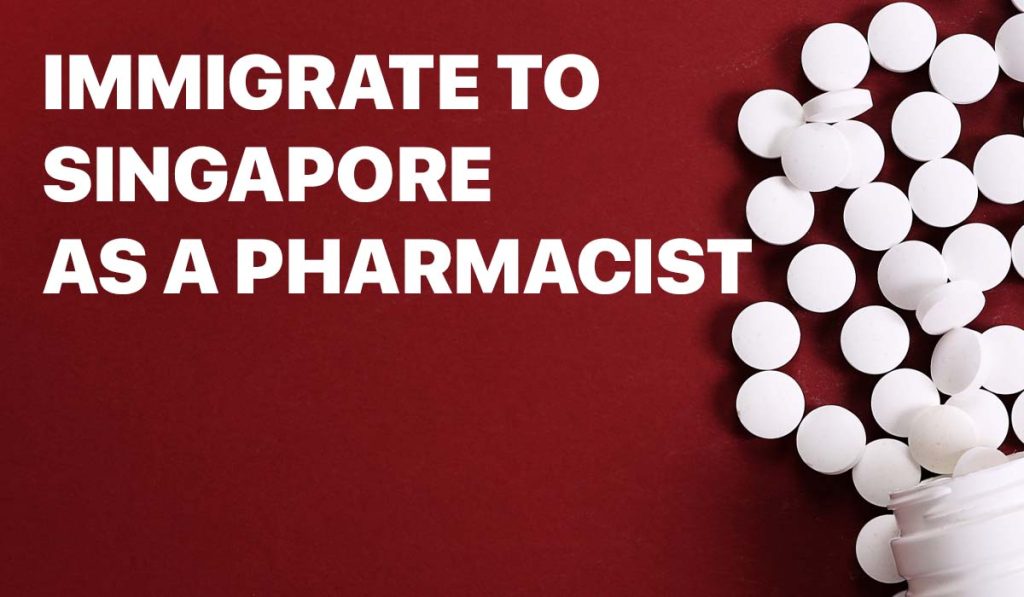Singapore blends tradition and modern life and offers a thriving healthcare system and great opportunities for pharmacists. If you’re ready to build your career, keep reading to learn how to Immigrate to Singapore as a Pharmacist!
How to Work as a Pharmacist in Singapore?
To work and immigrate to Singapore as a Pharmacist, follow these steps:
- Meet the Qualification Requirements
- Pass the Qualifying Exam
- Secure a Job Offer in Singapore
- Register with the Singapore Pharmacy Council (SPC)
- Obtain the Necessary Work Visa
- Prepare for Relocation
- Continuous Professional Development
Step 1. Meet the Qualification Requirements
To immigrate to Singapore as a pharmacist and start your career there, meeting the qualification requirements is the first critical step.
Qualifications
- Having a recognized degree in pharmacy
- Pre-registration Training for almost 12 months
- Professional Examinations
Additional Courses
- Specialized Clinical Pharmacy Courses
- Pharmaceutical Management and Regulatory Affairs Courses
- Continuous Professional Development (CPD) Courses
Language Requirements
The official language of instruction and healthcare in Singapore is English. Therefore, proficiency in English is a must for pharmacists, especially for communication with patients and healthcare professionals. The specific requirements are:
- Level B2 or higher is generally expected in a professional setting.
- Enrolling in English language courses or taking English language tests such as IELTS or TOEFL.
Step 2. Pass the Qualifying Exam
The qualifying exam for pharmacists in Singapore is a crucial step.
The Qualifying Exam
The qualifying exam is organized and administered by the Singapore Pharmacy Council (SPC). The components usually are:
- Forensic Pharmacy Examination
- Clinical Pharmacy and Therapeutics Examination
The duration of the entire qualification process, including preparation, sitting for the exam, and waiting for results, can take several months. They are held at least once a year. Candidates are advised to prepare for both components of the exam thoroughly. To sit for the exam, candidates must register with the SPC, typically by a specified deadline before the exam date.
Step 3. Secure a Job Offer in Singapore
Pharmacists in Singapore can work in various settings, including hospitals, community pharmacies, the pharmaceutical industry, research, and academia. Clinical Pharmacists in hospital settings, especially those with specialization in areas such as oncology, pediatrics, or critical care, Regulatory Affairs Pharmacists in the pharmaceutical industry, Pharmacy Managers or Directors, and Research Pharmacists or Clinical Research Coordinators are the best-paid pharmacy jobs in Singapore,
Where to Look for a Job Offer
Online Job Portals
- MyCareersFuture.sg
- JobStreet.com.sg
- Indeed.com.sg
Recruitment Agencies Specializing in Healthcare
- Recruit Express Healthcare
- Randstad Singapore
- Adecco Singapore
Step 4. Register with the Singapore Pharmacy Council (SPC)
The Singapore Pharmacy Council (SPC) is a statutory board under the Ministry of Health (MoH) in Singapore. The Steps to Register with the SPC are:
- Ensure you have a recognized pharmacy degree (either from a local institution or an overseas institution)
- The application for registration is submitted online via the Professional Registration System (PRS) on the SPC website.
- This includes academic certificates, transcripts, proof of identity (e.g., passport or NRIC), a recent passport-sized photograph, and any other documents specified by the SPC.
- Submit evidence of completing the required pre-registration training.
- For pharmacists with overseas qualifications not directly recognized for registration, passing the SPC’s qualifying examination is necessary.
- Applicants must provide a declaration of fitness to practice, including disclosing any criminal records, disciplinary actions, or health issues that might impact their ability to practice pharmacy.
- Upon applying and all required documents, you’ll be directed to pay the registration fee within the range of SGD 150 to SGD 400.
Requirements for Registration
- Qualification from a Recognized Institution
- Completion of Pre-registration Training
- Passing the Qualifying Exam
- Good Standing
- Fitness to Practice
- Professional Indemnity Insurance
Continuous Professional Development (CPD)
This involves participating in and documenting CPD activities that meet the criteria set by the SPC, ensuring pharmacists remain competent and up-to-date with the latest practices and knowledge in the field of pharmacy.
Step 5. Obtain the Necessary Work Visa
The most relevant visa for skilled professionals, including pharmacists, is the Employment Pass (EP), which is a work visa that permits foreign professionals, managers, and executives to work in Singapore. The Ministry of Manpower (MOM) in Singapore is responsible for its issuance. Here are the steps to follow:
- Secure a job offer in Singapore in a managerial, executive, or specialized role.
- Your employer or an authorized agent will submit an EP application on your behalf online via the MOM’s EP Online portal.
- MOM reviews the application, and this process typically takes about 3 weeks for most cases if submitted online.
- The minimum monthly salary for EP applicants is SGD 4,500 for younger applicants and higher for older applicants.
- The processing time for an EP application is about 3 weeks from the date of submission.
To learn about Work Visa for other jobs and countries, read our articles at Visa Library.
Required Documents
- Passport-sized photograph taken within the last three months, personal particulars page of the passport.
- Copies of your qualifications, including university transcripts and professional licenses, if applicable.
- The offer letter or employment contract specifies the job title, salary, and employment duration.
- If applicable, provide details of the Singapore-registered company sponsoring your application.
- Proof of registration or eligibility for registration with the Singapore Pharmacy Council.
Step 6. Prepare for Relocation
Preparing for relocation to Singapore involves several important considerations, including finding suitable accommodation, understanding the cost of living, and knowing what factors to consider to ensure a smooth transition. Here’s a comprehensive guide to help you prepare for your move to Singapore as a pharmacist.
Accommodation Types Available
- HDB Flats (Public Housing) are government-subsidized housing units and are the most common type of residence in Singapore. (from SGD 500 to SGD 1,000 per month)
- Condominiums and Private Apartments offer more amenities, such as swimming pools, gyms, and security services. (from around SGD 2,000 per month)
- Landed Property, which includes terraced houses, semi-detached houses, and bungalows. ( from SGD 3,500 per month)
Online Websites to Look for Accommodation
- PropertyGuru
- 99.co
- Carousell
- SRX
Step 7. Continuous Professional Development
Continuous Professional Development involves engaging in educational activities that enhance professional knowledge and skills. For pharmacists, this could include
- Attending workshops, seminars, and conferences.
- Completing online courses and webinars.
- Participating in research activities.
- Reading and contributing to professional journals.
- Undertaking postgraduate studies.
The goal is to stay tuned with the latest practices, innovations, and regulations in pharmacy and healthcare, thus ensuring the best possible care for patients.
CPD Requirements
Pharmacists in Singapore are required to obtain a minimum number of CPD points annually to renew their practicing certificate. These points can be gained through various activities categorized into different domains such as clinical, professional, and academic.
Groups and Committees to Enroll In
- the Pharmaceutical Society of Singapore (PSS)
- Special Interest Groups (SIGs) within PSS
- Hospital Pharmacy Committees
- Academic and Research Committees
- Professional Regulatory Committees
Learn more about immigrating to Singapore as a doctor with our comprehensive article.

Are Pharmacists in Demand in Singapore?
Pharmacists play a crucial role in Singapore’s healthcare system, which is renowned for its high standards and innovative approach to medicine and patient care. In recent years, the demand for pharmacists in Singapore has seen a significant uptick, spurred by the expansion of healthcare services and the increasing need for pharmaceutical care amidst a growing and aging population. The country’s emphasis on chronic disease management and preventive care has further intensified the need for skilled pharmacists in both community and hospital settings. Consequently, pharmacists with specialized skills in clinical pharmacy, oncology, and geriatrics, in particular, are finding a robust job market. Singapore’s dedication to healthcare excellence and its embrace of cutting-edge treatments and technologies mean that pharmacists with a forward-thinking mindset and a commitment to continual learning are highly valued and sought after, suggesting a positive employment outlook in this sector for the foreseeable future.
How Much Does a Pharmacist Earn in Singapore?
In Singapore, the earnings of a pharmacist can vary widely based on experience, specialization, and the setting in which they practice. Entry-level pharmacists often start with a salary that reflects the rigorous training and education required in the field, typically ranging from SGD 3,000 to SGD 4,500 per month. With experience, these earnings can increase significantly, and pharmacists with several years of experience or those in specialized areas of practice can expect to earn between SGD 5,000 and SGD 8,000 per month. Senior pharmacists in managerial roles or with advanced specializations, particularly those in hospital settings or those involved in research and development, can command monthly salaries upwards of SGD 9,000. These figures reflect the critical role pharmacists play in Singapore’s healthcare system, and the remuneration is competitive to attract and maintain a high caliber of professionals in the field.
Is Pharmacy a Good Career in Singapore?
Pharmacy is considered a promising and rewarding career in Singapore, owing to the nation’s robust healthcare infrastructure and its commitment to medical excellence. Pharmacists are integral to the healthcare team, enjoying a well-respected status and diverse career opportunities ranging from clinical practice in hospitals to roles in community pharmacies, research, academia, and the pharmaceutical industry. The profession’s adaptability to technological advancements and the burgeoning biomedical sciences sector in Singapore also provide dynamic career progression paths. Additionally, the government’s investment in health services and the increasing demand for pharmaceutical expertise in chronic disease management and elderly care contribute to job security and professional growth. With competitive salaries, opportunities for continuous professional development, and the prospect of making a significant impact on patient care, pharmacy stands as a compelling career choice in Singapore’s forward-looking healthcare landscape.
How to Study and Become a Pharmacist in Singapore?
Follow these steps for a smooth transition to beautiful Singapore as a pharmacist:
- Select an Accredited Pharmacy Program
- Apply for University Admission
- Obtain a Student’s Pass (Student Visa)
- Complete the Pharmacy Degree
- Register with the Singapore Pharmacy Council
- Secure a Pharmacist Position in Singapore
- Apply for a Work Visa
Step 1. Select an Accredited Pharmacy Program
To qualify as a pharmacist in Singapore, accreditation from recognized programs is vital, with the National University of Singapore (NUS) and Nanyang Technological University (NTU) offering reputable options. The Bachelor of Pharmacy curriculum encompasses pharmaceutical sciences, pharmacy practice, and pharmacotherapy, featuring clinical placements for hands-on experience. Admission hinges on a robust academic background, particularly in sciences like chemistry and biology, along with English proficiency. Candidates must hold qualifications akin to Singapore-Cambridge GCE A-levels, such as the International Baccalaureate (IB) diploma. They may require SAT or ACT scores, alongside interviews or entrance exams, varying per university. Thorough research into specific requirements is advisable for adequate preparation.
Step 2. Apply for University Admission
Applying to universities in Singapore involves crucial steps: identify deadlines, submit online applications with required documents, including transcripts and test scores, and demonstrate English proficiency. The process, lasting months, may entail interviews or additional document requests. Competitive programs like pharmacy emphasize robust applications. Accepted students must fulfill conditions and connect with peers and university services for a smooth transition to studying in Singapore.
Step 3. Obtain a Student’s Pass (Student Visa)
Securing a Student’s Pass is imperative for international students intending to study in Singapore. The application, managed by the Immigration & Checkpoints Authority (ICA) via the Student’s Pass Online Application & Registration System (SOLAR), demands acceptance into a full-time program beforehand. Essential documents include:
- A valid passport.
- Completed application form.
- University offer letter.
- Recent passport-sized photos.
- Proof of financial capability to cover expenses.
Processing typically takes around four weeks, with potential interviews as part of the visa process. Demonstrating sufficient funds through bank statements or sponsorship letters is essential.
Step 4. Complete the Pharmacy Degree
Completing a pharmacy degree in Singapore typically spans four years of full-time study. Tuition fees vary among institutions and are subject to change, necessitating regular checks on university websites for updated costs. Financial aid and scholarships may assist international students in managing expenses. While studying, those on a Student’s Pass can work part-time up to 16 hours weekly during term and full-time during holidays without an additional work permit, aiding in covering living costs. The program integrates academic coursework with practical internships, vital for skill development and post-graduation employability through networking opportunities.
Step 5. Register with the Singapore Pharmacy Council
The Singapore Pharmacy Council (SPC) oversees the standards and practices of pharmacists in Singapore, mandating registration for practice. Graduates must fulfill SPC’s requirements, including passing the Pharmacist’s Pledge and potentially a competency examination for degrees from non-accredited overseas institutions. Applications entail the submission of academic records, proof of identity, and relevant certificates. SPC assesses applicants against registration criteria, including professional conduct and health status. Registration signifies legal authorization to work in Singapore, affirming qualifications and readiness to serve the healthcare sector.
Step 6. Secure a Pharmacist Position in Singapore
Securing a pharmacist position in Singapore requires strategic approaches. Crafting a robust resume emphasizing education, skills, and relevant experience is paramount. Networking, job fair attendance, and connecting with industry professionals offer valuable leads and insights. Online job portals like JobStreet, MyCareersFuture.sg, and LinkedIn, as well as healthcare-focused recruitment agencies, are valuable resources. Candidates with experience or skills in high-demand areas like clinical pharmacy, oncology, or geriatrics may gain a competitive edge. Continuous professional development and specialized certifications enhance employability. The application process may entail detailed submissions, interviews, and practical assessments or job trials.
Step 7. Apply for a Work Visa
Upon securing a pharmacist position in Singapore, the subsequent step entails obtaining a work visa, contingent on individual qualifications and the job’s nature. The employer typically initiates the application process with the Ministry of Manpower (MOM). Detailed information regarding the applicant, including salary, job description, and qualifications, is requisite for the application. While processing times vary, decisions are typically rendered within weeks. Approval hinges on meeting MOM criteria, encompassing salary thresholds and qualifications. Transitioning from a Student’s Pass necessitates careful timing and coordination with the employer to ensure compliance with Singapore’s immigration regulations.
How to Be a Pharmacist in Singapore From the Philippines?
To become a pharmacist in Singapore from the Philippines, one must complete a recognized pharmacy degree, either locally or from an accredited institution in the Philippines. Graduates may need to pass the Pharmacist’s Pledge and meet additional requirements set by the Singapore Pharmacy Council (SPC), including a pre-registration training period and passing a competency assessment or the Qualifying Examination. Those from internationally recognized universities have better chances. Pharmacists with sought-after skills like clinical pharmacology or hospital pharmacy experience are favored. Navigating this process involves obtaining qualifications, completing assessments, securing a job offer, and applying for a work visa.
Work and Immigrate to Singapore as a Pharmacist: Let’s Recap!
In conclusion, commencing a career as a pharmacist in Singapore involves fulfilling qualification requirements, securing employment, and navigating registration and visa processes. With dedication and preparation, pharmacists can contribute to Singapore’s healthcare landscape and pursue fulfilling opportunities.
FAQs
The key steps include:
- Meeting qualification requirements
- Passing the qualifying exam
Securing a job offer - Registering with the Singapore Pharmacy Council
- Obtaining the necessary work visa
- Preparing for relocation
Qualification requirements include:
- Having a recognized pharmacy degree
- Completing pre-registration training
- Passing professional examinations
- Demonstrating proficiency in English
Pharmacists can explore job opportunities through online job portals like MyCareersFuture.sg, JobStreet.com.sg, LinkedIn, and recruitment agencies specializing in healthcare positions.
The process involves:
- Submitting an online application through the SPC website
- Providing required documents such as academic certificates and proof of identity
- Completing pre-registration training
- Passing the qualifying exam, if necessary
- Demonstrating fitness to practice
Pharmacists can apply for the Employment Pass (EP), which is a work visa for foreign professionals, managers, and executives. The EP application process involves:
- Securing a job offer
- Submitting required documents
- Meeting salary thresholds set by the Ministry of Manpower (MOM)
How useful was this article?
Click on a star to rate it!
Average rating 3.1 / 5. Vote count: 7
No votes so far! Be the first to rate this article.
- Author
- Max-B.
- February 21, 2024





